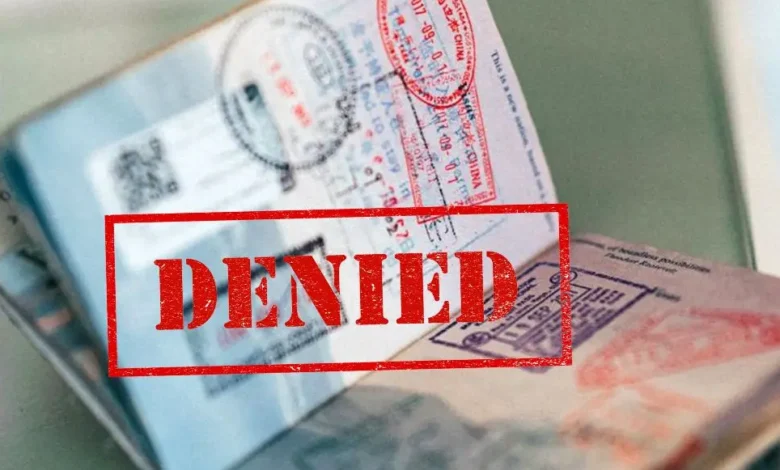Why 90% of travelers are Denied Entry into Germany upon arrival

Germany, as one of the most popular destinations in Europe, attracts millions of tourists, business travelers, students, and migrants every year. However, it is not uncommon for travelers to face difficulties upon arrival, with a significant number being denied entry. While securing a visa may seem like the hard part, many travelers are shocked when they are turned away at the border, even after receiving approval for their visa. Surprisingly, up to 90% of applicants who are denied entry into Germany face these issues despite having the necessary visa. But why does this happen?
Here are some of the most common reasons why travelers are denied entry into Germany upon arrival:
1. Failure to Meet Border Control Requirements
One of the most common reasons travelers are denied entry into Germany, even after obtaining a valid visa, is failing to meet the requirements set by border control officers. The visa application process allows for preliminary screening, but border officers are empowered to assess your purpose of entry, travel intentions, and overall eligibility based on your behavior and documentation upon arrival.
What can go wrong?
- Lack of supporting documentation: Although you may have a visa, failure to present key supporting documents like proof of accommodation, return flight bookings, or sufficient funds for the duration of your stay can raise red flags.
- Inconsistent travel plans: Border officers may question travelers if there are inconsistencies in their travel itinerary, such as unclear reasons for entry or sudden changes in destination.
- Poor travel history: Frequent travelers without a history of honoring visa conditions in the past might be scrutinized more closely.
2. Misunderstanding of Visa Type and Purpose of Visit
Germany, like many Schengen Area countries, issues different types of visas depending on the traveler’s purpose: tourist visa, business visa, student visa, etc. Even if you hold a valid visa, the border authorities will assess whether your actual purpose of entry matches the visa you were issued.
What can go wrong?
- Tourist Visa Misused for Work or Business: If you enter Germany on a tourist visa but intend to work or conduct business, border officers may consider this a violation of visa conditions. The Schengen visa system is strict, and engaging in unauthorized activities can lead to immediate denial of entry.
- Not Having the Proper Documents for Your Purpose: If you are traveling for study or business, but fail to present the right documents like admission letters, sponsorships, or business meeting invitations, the officers may determine that you are not eligible for entry.
3. Insufficient Funds or Proof of Financial Stability
A critical factor for being granted entry to Germany is proving that you can financially support yourself during your stay. Travelers are often required to show proof that they have sufficient funds to cover their accommodation, food, and other expenses for the duration of their trip.
What can go wrong?
- Unclear Proof of Funds: Border officials may deny entry if your financial documents (bank statements, credit cards, sponsorship letters) are not clear or do not demonstrate sufficient funds for your intended stay.
- Inconsistent or Suspicious Financial Evidence: Providing bank statements that show a sudden deposit or any form of inconsistency in your financial evidence could raise suspicions, especially if the funds are deemed insufficient for your intended stay in Germany.
4. Overstay or Violation of Schengen Rules in the Past
Germany, as part of the Schengen Area, has strict rules when it comes to overstaying visas or violating previous visa conditions. Travelers who have overstayed their visa or violated Schengen rules in the past are more likely to face stricter scrutiny upon entry.
What can go wrong?
- Previous Overstay: If you have previously overstayed your Schengen visa or violated any entry rules during a past visit to Germany or other Schengen countries, border officials will likely deny you entry, even if you have a valid visa.
- Failure to Exit on Time: If records show that you didn’t leave a Schengen country on time during a previous visit, the authorities may refuse to grant you entry again, citing that you did not comply with the rules in the past.
5. Lack of Clear Intent to Return to Home Country
Germany, like all Schengen countries, wants to ensure that travelers will return to their home countries after their visit. Border officers assess your likelihood of overstaying based on various factors, including your ties to your home country, job stability, family connections, and more.
What can go wrong?
- No Clear Return Plans: If you cannot provide convincing evidence that you plan to return to your home country (e.g., return flight tickets, job offer, family obligations), border officers may believe that you are planning to overstay or migrate to Germany illegally.
- Weak Ties to Home Country: If you have no strong ties to your home country, such as a stable job or family, this can raise concerns that you may not have any incentive to leave Germany once your visa expires.
6. Suspicion of Intent to Seek Asylum or Illegal Migration
Germany is a top destination for refugees and asylum seekers, and border control officers are vigilant when it comes to people who may be seeking to enter the country with the intention of seeking asylum or illegally migrating.
What can go wrong?
- Behavioral Red Flags: If your behavior upon arrival seems evasive or suspicious, border officers may suspect that you intend to seek asylum or overstay your visa. They may conduct additional questioning or deny entry altogether.
- Traveling with Insufficient Documents: Travelers who arrive without the necessary documentation and are found to be traveling without a clear and legitimate reason for entering may be suspected of attempting to enter illegally.
7. Health or Security Concerns
In rare cases, health or security concerns can be grounds for denying entry into Germany. The COVID-19 pandemic, for example, has led to increased scrutiny at borders, and travelers may be denied entry if they fail to meet health or safety protocols.
What can go wrong?
- Health Issues: If you are not vaccinated (in the case of ongoing health crises), or fail to provide adequate health documentation, you may be denied entry.
- Security Concerns: If you have a criminal record or are deemed to pose a security risk to Germany, the authorities may refuse entry based on national security protocols.
While having a valid visa is an essential step toward traveling to Germany, it does not guarantee entry upon arrival. Border authorities have the discretion to deny entry if they believe the traveler does not meet the necessary requirements. To ensure smooth entry, it’s important to carefully plan your trip, provide accurate and complete documentation, and be prepared to explain the purpose of your visit. Taking these steps can greatly reduce your chances of being part of the 90% of travelers who are denied entry into Germany.
Source: http://thepressradio.com





